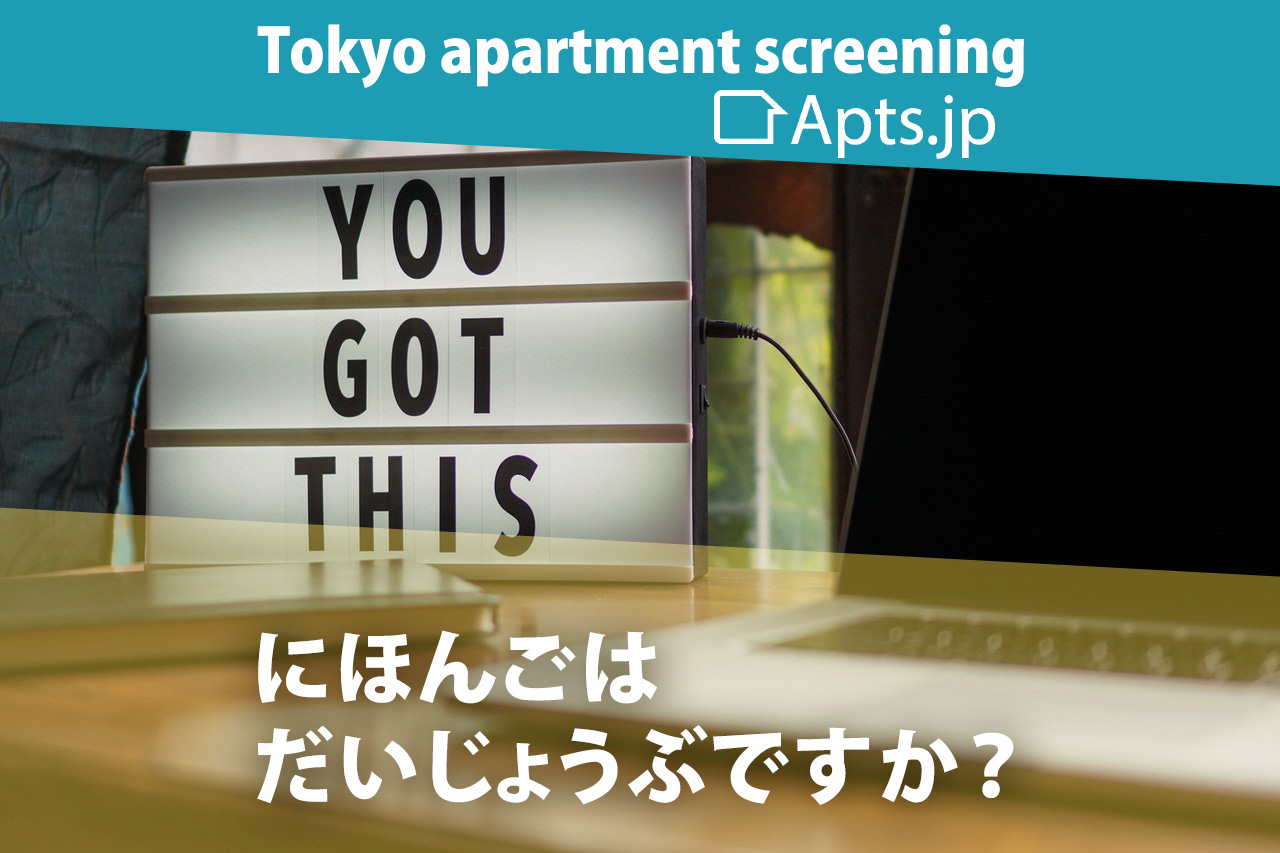Japanese For Apartment Screening
Brush up on Japanese for apartment screening!
So you’ve found an awesome Tokyo apartment, and you have submitted your application. What can you expect to happen next? Before you contract and can get those keys in your hands, you need to pass a hurdle: the screening process.
In Tokyo, apartment screening for expats can either be had in English or Japanese. Apartment screening generally takes 6~8 days (sometimes over 10 days), and this is where the guarantor company and property manager are researching viability of a tenant for leasing. During screening time, you will be receiving a call from the guarantor company or property manager to ask you a few questions. Although screening can sometimes be in English, other apartments will only have their screenings in Japanese.
At Apts.jp, we pre-screen all apartments we show clients, to ensure the highest chance of passing screening for each client’s situation. There are apartments that require no Japanese for screening, but there are also those that require just conversational Japanese and up; some require very high-level Japanese.
★ Sometimes clients are on the border of conversational Japanese, though, and in these cases, this article is a good overview of the type of Japanese required to pass screening!
If you have 100% NO Japanese skills, though, this is not a problem! We have tons of clients who don’t speak or read any Japanese. Contact us, whether you have Japanese skills or not. (If you haven’t started the apartment hunt process yet, our 9 Steps For Renting A Tokyo Apartment is a good read.)
If your apartment requires spoken Japanese- and if you could use a brush up on your Japanese skills- read on!
Why Is There a Screening Process, and What Does It Accomplish?
For a job interview, an employer would want to verify that you are the type of hard-working person you claim to be. For apartments, property managers in Japan are looking for solid tenants. The guarantor company (they do most of the screening) wants to confirm that you are a reliable tenant, that you can respectfully rent the apartment, and that you can keep making your monthly payments on time. Such screening is based on the case we build up for our clients; based on documents that we collect from you and submit on your behalf during the application process, such as ID, employment proof, and emergency contact. Last part of main screening, is the phone call (last last step, is owner decision).
Typically, you will receive a phone call from the guarantor company, but in some cases, the property manager can also ring you. As mentioned, some apartments require tenants to speak Japanese, and in these cases, the guarantor call will be a slight test of your spoken Japanese ability.
We have put together some questions and answers to help you brush up, since you are probably not having these conversations daily with your buddy at your local yakitori pub.
The Phone Interview! Let’s Sharpen That Japanese

Please remember that all answers should be truthful, honest, and help reassure the property manager that you are a reliable tenant.
Even though there is no one-size-fits-all phone interview, and different companies may ask other questions with a different flow. That being said, most phone interviews look something like the following…
– – – – – –
Q: What is your name?
“Onamae wa nandesu ka? / Onamae wo oshiete kudasai.”
(おなまえはなんですか。/おなまえをおしえてください。)-
A: My Name is <YOUR NAME>.
“Watashi no namae wa, <YOUR NAME> desu.”
(わたしのなまえは、<YOUR NAME>です。)
– – – – – –
Q: Please tell me your date of birth?
“Seinen gappi wo oshiete kudasai.”
(せいねんがっぴをおしえてください。)-
A: My birth date is <YOUR BIRTH DATE (YYYY/MM/DD)>
“Watashi no Seinen gappi wa <YYYY> nen <MM> gatsu <DD> nichi desu.”
e.g. 1993/8/22 or August 22nd, 1993 =
“Sen kyu-hyaku kyu-jyu-san nen, hachi-gatsu, nijyu-ni nichi desu.”
(1993ねん8がつ22にちです。)
– – – – – –
Q: What is your [income / annual income]?
“[Shyuunyuu / nenshyuu] wa oikura desyou ka.”
([しゅうにゅう / ねんんしゅう] はおいらでしょうか。)-
A: My income is <your annual income (JPY)>.
“Watashi no shyuunyuu (or nenshyuu) wa <your annual income> en desu.”
(わたしのしゅうにゅう(or ねんしゅう)は、<your annual income> えんです。)
e.g. 8 million yen per year =
“Watashi no shyuunyuu wa happkayu man en desu.”
(わたしのしゅうにゅうは、はっぴゃくまんえんです。)
– – – – – –
Q: What is your current resident type?
“Ima osumai no keitai wo oshiete kudasai.”
(いま、おすまいのけいたいをおしえてください。)-
A: I am currently living in a [corporate housing / monthly apartment].
“Ima sundeiru tokoro wa, [syataku / monthly] desu.”
(いま、すんでいるところは、[しゃたく / マンスリー] です。)
– – – – – –
Q: What is your relationship with <Mr/Ms Your Emergency Contact Name>?
“<Your Emergency Contact Name>-san towa donoyouna gokankei desyou ka.”
(<Your Emergency Contact Name>さんとは、どのようなごかんけいでしょうか。)-
A: [He / She] is my [colleague / relative / friend].
“[Kare / Kanojyo] ha watashi no [douryou / shinseki / yuujin] desu.”
(かれ / かのじょ は、わたしの [どうりょう / しんせき / ゆうじん] です。)
– – – – – –
Q: Do you agree that your guarantor fee is [Amount of Guarantor Fee (JPY)]?
“Hosyou ryo wa [Amount of Guarantor Fee] yen to narimasuga goryou syou itadakemasuka.”
(ほしょうりょうは、[Amount of Guarantor Fee]えんとなりますが、ごりょうしょういただけますか。)-
A: Yes, I agree.
“Hai, kashiko mari mashita.”
(はい、かしこまりました。)
– – – – – –
Other questions that could pop up might be something like:
• When do you/or when did you start work?
• What was your previous job, and how long were you employed?
• How long do you intend to stay in Tokyo? (Answer should be about 2-4 years or what coincides with your residence card)
Please keep these in mind when preparing for your phone interview. Please feel free to contact us, if you have any doubts on your spoken Japanese.
There are times when a guarantor company might throw you a curveball and ask you whether you plan on doing any prohibited activities, such as “will you BBQ or have loud parties,” etc. Of course, if such questions are asked, please answer with the utmost respect (which should be “no”).
However, if they start asking unrelated questions that don’t seem pertinent to renting the apartment, you can always politely refrain from answering.
After Passing Screening

After you pass your screening, you are now on the home stretch!
All that is left to do is pay your move-in costs, contract, and then you can call that apartment your new home.
Our main goal is to get you into a great apartment or house in Tokyo, and we are more than happy to help assist you in any way.
Please, please, please, (we cannot stress this enough!) go over these Japanese questions and answers, so when you get your screening phone call, you are more than prepared and ready to ACE your screening.
Let us help you get into that great Tokyo apartment on your first try!
And of course, if you speak no Japanese at all– no problem. We got your back, as well. 🙂
•• Tokyo Apartment Hunting With Kemushichan
•• 4 common Misconceptions About Renting A Tokyo Apartment
••9 Steps For Renting A Tokyo Apartment
